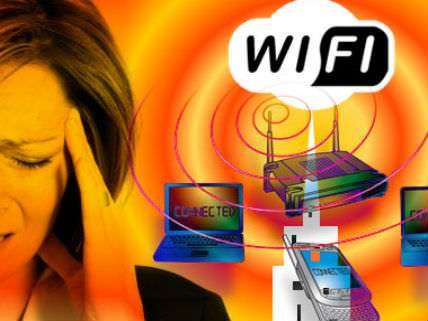Clickbaiting Misinformation: Your Wifi Will Kill You - NOT
Top story at Drudge is CBS article promoting discredited activist claims about electromagnetic hypersensitivity.

The New York CBS affiliate is running a story about a woman who hooked up wifi in her apartment and began to have headaches, body flushing, and "brain fog." The story is unfortunately at the top of the Drudge Report today.
The first questions might be why did she wait until 2015 to set up wifi and why has she never apparently experienced symptoms while sipping lattes at Starbucks? But never mind. In any case, the CBS report goes on to cite electromagnetic hypersensivity "researcher" David Carpenter. From CBS:
Dr. David Carpenter, an Environmental Scientist and expert on wi-fi's effects said the scientific link between wi-fi and health is clearly emerging.
"There is a body of evidence that is strong. it's not 100 percent understood, but it's strong evidence that this is a real syndrome that causes real harm to real people," he said.
Dr. Carpenter said it's a significant problem for about 5 percent of the population, many of them have no idea that wi-fi is to blame.
"They walk around feeling ill and they don't know what to do about it," he said.
Other doctors counter that the evidence connecting wi-fi to illness just isn't there.
"It's a psychological phenomenon," neuropsychologist Dr. William Barr said.
Dr. Barr said some people may have symptoms, but what causes them is something else altogether. He said the power of suggestion may play a role.
Power of suggestion? Well, yes. For example, this 2013 study in the Journal of Psychosomatic Research reports the amusing results of an experiment in which 150 subjects listened to a TV story about the adverse health effects of wifi. The researchers then "exposed" the subjects to a sham wifi signal for 15 minutes. More than half the subjects then reported symptoms that they attributed to the sham exposure. The higher participants scored on a psychological anxiety scale, the more likely they were to report symptoms. The researchers conclude:
Media reports about the adverse effects of supposedly hazardous substances can increase the likelihood of experiencing symptoms following sham exposure and developing an apparent sensitivity to it. Greater engagement between journalists and scientists is required to counter these negative effects.
Thanks a lot Drudge and CBS! Shame on you for scaremongering for clicks!
By the way, it's trivially easy to find non-activist information. For example, based on a review of the scientific literature, the World Health Organization states:
Considering the very low exposure levels and research results collected to date, there is no convincing scientific evidence that the weak RF signals from base stations and wireless networks cause adverse health effects.
No convincing evidence.


Show Comments (159)